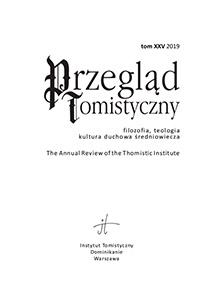MANFRED SCHULZE, Gregory of Rimini: Science, Theology and Piety. The Controversy about the Original Sin in Maria and Unbaptized Children

Volume XXV: 2019
Philosophy — Theology — Spiritual culture of the Middle Ages
ISSN 0860-0015
e-ISSN 2544-1000
SUMMARY
Gregory of Rimini († 1938) is one of the most significant Augustinian theologists from the theology school of the university of Paris. His commentary on the first two Sentences books of Peter Lombard is passed on to us. He distinguished himself through consequential thinking in connection with Aristoteles and Augustine. He adopts Aristoteles’ scientific doctrine that all knowledge must be proven on the basis of evident principles. Theology cannot fulfill these requirements because its’ principles are based on the holy belief in the word of God. Theological deductions are systematic, logically ensured results based on the necessity for religious truths found in the bible. Gregory’s theological methodology is based on the controversial issue as to whether the Virgin Mary was conceived in the womb without any original sin. The pious at the time worshipped Mary as unblemished free from all sin, mother of God. Gregory strictly objects to this. The basis for this piety is not to be found in the Bible, evermore so is the evident principle that all of mankind are cast under the law of original sin, which includes Mary.
Gregory writes that original sin, in referencel to Augustine’s thinking, is a deep invasion of evil into the nature of mankind, which entails the punishment of God on the spirit and the senses when humans die without having being baptized. The matter in question is: do the senses of an infant also get punished when it dies in utero or shortly after birth, without having been baptized?
The gentle-hearted pious man resists this way of thinking, but Gregory follows Augustine and insists on the punishment of the senses, also for unbaptized children.
This is not founded on any biblical principles, which means that Gregory ultimately has to remain with the rules of his theological methodology: without any biblical principles there are convictions but no binding theological outcomes.
